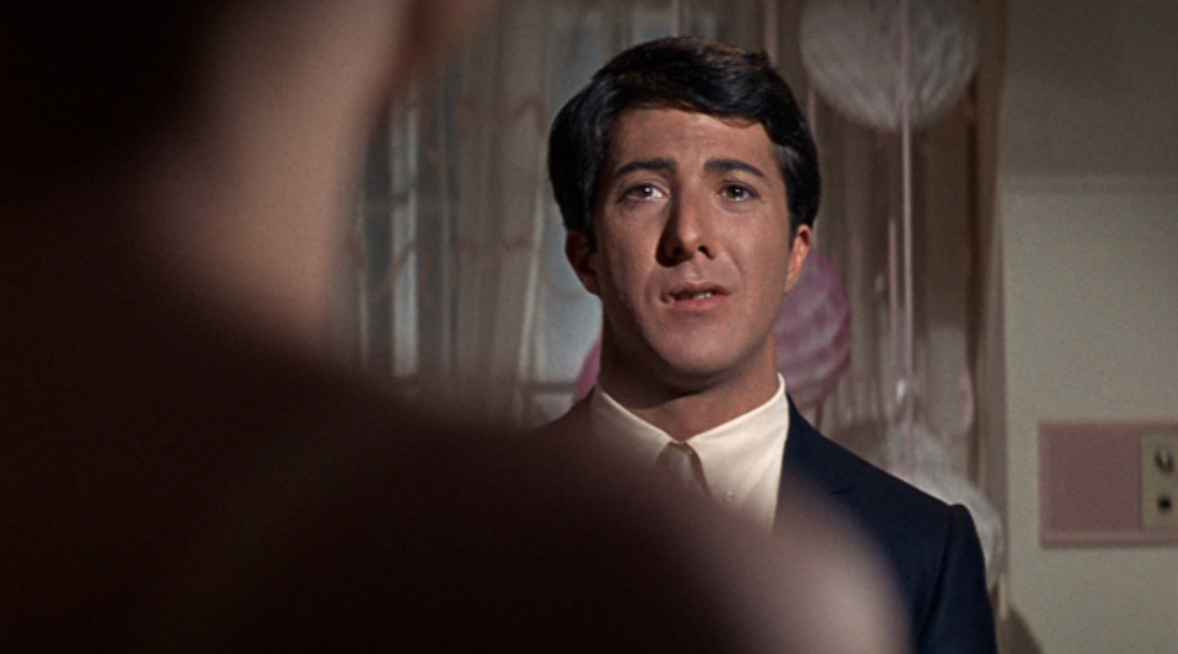Mike Nichols and Buck Henry‘s The Graduate, perhaps the most culturally on-target, stylistically audacious and emotionally affecting relationship comedy in Hollywood history, opened exactly a half-century ago — on 12.22.67. But guess what? It’s time for a significant portion of that respect and glorification to go away, and for two reasons. I’m presuming that HE readers can guess the first without reading any further.
Just as former New York Post critic Lou Lumenick proclaimed a couple of years ago that Gone With The Wind has become a disreputable and even odious film because it reflects unfortunate racial attitudes of the late 1930s, Vox’s Alissa Wilkinson announced yesterday that it’s time to take The Graduate down a peg or two, partly because of recent allegations of sexual harassment and assault against Dustin Hoffman, and partly because Benjamin Braddock is a dullard — a far less interesting character than Anne Bancroft‘s Mrs. Robinson or even Katherine Ross‘s Elaine Robinson.
HE response #1: Deplorable as Hoffman’s behavior is alleged to have been during certain encounters in the ’80s, when The Graduate was shot he was a 29 year-old actor doing his damnedest to make the Braddock character sympathetic and engaging, and for the last half-century just about the entire civilized world has agreed that he achieved that goal. You can’t come along 50 years later and say “But Hoffman acted like a sexist asshole in the ’80s!” and so everything he did creatively before, during and after the Reagan era has to be darkly re-assessed.
HE response #2: On top of which Nichols and Henry, The Graduate‘s director and screenwriter, deliberately portrayed Braddock as confused, unfocused, de-politicized and largely inarticulate for the first 65 minutes. That was all a set-up for the big pivot point when Benjamin realizes he loves Elaine and is determined to end his affair with her mother. The first hour and change is about a bumbling guy in a passive-reactive state of mind, and the last 35 or 40 minutes is about this guy struggling to achieve a goal and attain a kind of emotional fulfillment.
HE response #3: Wilkinson doesn’t take credit for her “Mrs. Robinson is a more layered and intriguing character than Braddock” opinion, which I happen to agree with as far as the first 65 minutes is concerned. She acknowledges, in fact, that Roger Ebert offered this opinion at the time of the film’s 30th anniversary. She could have added that Sam Kashner said the same thing in a 2008 Vanity Fair piece about the making of The Graduate.
“Forty years after The Graduate first appeared, Mrs. Robinson now seems the most complex and compelling character in the film, in part due to Anne Bancroft’s stunning performance. That she’s an alcoholic, that she’s trapped in a sexless marriage, that she’s predatory, cool, and ironic — those are the traits that make her dangerous. That she was once an art major, a fact she reluctantly reveals to Benjamin in his one attempt at pillow talk, makes her vulnerable. We suddenly understand her — her bitterness, her deep pool of sadness. It’s the key to her character, Buck Henry believes: ‘That’s when I realized that I knew Mrs. Robinson. That she had been Benjamin. She is a very intelligent and cynical woman. She knows what’s happening to her.'”
An excerpt from Wilkinson’s piece:
“We can’t watch movies like The Graduate quite the same way anymore. For one, Dustin Hoffmann, who starred earlier this year in The Meyerowitz Stories, has been accused by numerous women of sexual harassment and assault, all of which occurred after the filming of The Graduate but can’t, and shouldn’t, be brushed aside.”
A good observation: “And in an unforgettable early scene, Mrs. Robinson has Benjamin drive her home, then lures him upstairs and takes off clothing as he protests vehemently — a scene that feels uncomfortably close to many of the kinds of allegations that have been made against powerful men from Harvey Weinstein onwards this year.
“What happens next is instructive. Benjamin changes his mind and invites Mrs. Robinson to the Taft Hotel, where they start an affair that seems born out of boredom and curiosity for him and some kind of desperation for her. Neither is interested in the other in any way that even vaguely resembles romance, but it becomes clear at some point that Benjamin has the upper hand simply because of who he is: free, young, wealthy, with his whole life in front of him, and she needs him, on some level, to assure her she’s not invisible.
“Elaine’s attraction to Benjamin is also improbable — they barely seem to have a conversation throughout the whole movie — but it doesn’t seem to matter, to the film or to the characters. Elaine is more or less a blank canvas for others to write their futures on. And devoid of actual interests of his own, Benjamin is destined for a lifetime of getting what he wants and then getting tired of it.”
“I think Ebert was right: It’s Mrs. Robinson who’s the film’s most fascinating character. But I’d love to see what The Graduate would feel like told from Elaine’s perspective, and get a sense of what she was thinking all along. Elaine and Benjamin’s parents are business partners, after all, and live the same kinds of lives. Benjamin turned out to be a dud. But in 2017 it’s Elaine, the daughter of privilege who doesn’t seem interested in waiting around like Benjamin, whose story I want to see.”

